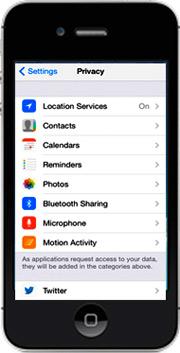Apple Moves To Stop Location-Tracking By Mobile Analytics Companies
- by Wendy Davis @wendyndavis, June 9, 2014
 Apple's upcoming operating system could prevent analytics companies from tracking iPhone and iPad users in brick-and-mortar stores, according to a privacy presentation given at the Worldwide Developers Conference.
Apple's upcoming operating system could prevent analytics companies from tracking iPhone and iPad users in brick-and-mortar stores, according to a privacy presentation given at the Worldwide Developers Conference.
The company said in the presentation that iOS 8's WiFi scanning will use “random, locally administered MAC addresses,” instead of the permanent MAC addresses. The move is significant because the retail analytics companies that track shoppers in stores do so via their devices' 12-digit “media access control” (MAC) addresses -- identifiers that are broadcast when users turn on WiFi or Bluetooth.
Apple didn't respond to a request for comment for this article.
Observers say the change could put a big crimp in companies' ability to track brick-and-mortar shoppers who use iPhones and iPad devices. “It's likely to siginificantly affect companies that are tracking Mac users,” says Jules Polonetsky, executive director of the industry-funded think tank Future of Privacy Forum.
The move comes as Apple is rolling out its own iBeacon technology -- a Bluetooth low-energy based system that enables smartphone users to interact with sensors in stores.
Apple's news comes several months after the Future of Privacy Forum moved forward with a privacy initiative aimed at enabling consumers to opt out of location tracking. The group launched a Web site, www.smartstoreprivacy.org, where consumers can reject location-tracking by entering their devices MAC addresses.
Eleven mobile analytics companies had agreed to honor those opt-outs as part of a new industry code of conduct. The analytics companies typically provide location data to retailers and mall owners, who often use the information to assess traffic patterns. For instance, location data can show whether a mall's anchor store is driving traffic to other, smaller shops.
The data is only presented to retailers in aggregated form, but the technology is controversial, with some observers saying that consumers don't expect that their phones will be used to track them. Sen. Al Franken (D-Minn.), who often expresses concern about potential privacy violations, has said that location tracking should require users' opt-in consent.
Justin Brookman, head of consumer privacy for the digital rights group Center for Democracy and Technology, praised Apple's decision. “Obviously, there's been a lot of concern about using WiFi probing signals to track phones in unexpected ways, so it's gratifying to see them respond to the concerns of their customers,” he says.



Restraint of trade anyone? Hiding one's own commercial interests under the banner of privacy, when they intend to try to dominate location based services themselves. We must as a public and commercial email system, stop encouraging monopolistic behavior by Apple. There are numerous benefits for consumers with GPS-based services and consumer tracking actions, so some balance between tracking actions and commerce interaction must be found. The answer is not in denying other tracking services and Apple only allowing their own service to track your actions. Tracking is tracking.
'public and commerce system'.... Correction (autocomplete funky)
Scott, you are 100% correct that this isn't about privacy but not sure it is restraint of trade either.
3rd party tracking solutions provide little perceived value to the end user -- there is no value exchange present when I give up my location information so someone else can make money on it. This is the same problem that 3rd party cookies face on the desktop.
Companies like Apple (and Facebook, Google, Amazon, and lesser extent Microsoft) have a clear value exchange for consumers and consumers will willingly give up their information to them in exchange for access to their services. As we move to a cross channel world, these companies are in the catbird's seat as regards being able to paint a full picture of the consumer and their activity.
It won't stop them tracking people, it will ensure they move from an Mac IP system to an iBeacon system, which, will be a much better data collection system and response mechanism for all.
+1. It's not really about retail. You're potentially tracked by every Wifi network that you walk or drive by, or in the next office at work, or anyone nearby using their phone as a hotspot. Good move by Apple to keep customer confidence.
In response to tracking by MAC address? Really?
“It's likely to significantly affect companies that are tracking Mac users,” says Jules Polonetsky, executive director of the industry-funded think tank Future of Privacy Forum.
Automatic disqualification from the tech punditocracy!